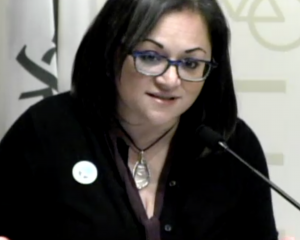Oak Park urged to offer ‘zero cooperation’ on deportation
By Jean Lotus Staff Reporter — January 25, 2017
Immigration attorney Mony Ruiz-Velasco of P.A.S.O. (West Suburban Action Project) speaks to the Oak Park Village Board Jan. 17. (Photo courtesy of Village of Oak Park)
The Village of Oak Park Board delayed a vote Jan. 17 on a “Welcoming Village” ordinance to protect residents from questions about immigration status, after complaints that the ordinance needed to be strengthened and was “full of loopholes” and “diluted.”
Formerly referred to as “sanctuary city” laws, the new “welcoming ordinance” was crafted with language used by the cities of Chicago and Evanston. But immigration activists and others said it wasn’t strong enough.
“There’s no way [President] Donald Trump is going to deport 2 [million] to 3 million people without deputizing local officials,” said immigration lawyer Mony Ruiz-Velasco, executive director of P.A.S.O. (West Suburban Action Project) during public comments. “We’re here to make sure Oak Park passes the strongest welcoming village ordinance and serves as a model for the rest of the suburbs and the country. We want a policy of zero. We want zero collaboration with immigration agencies.”
“I would ask that you look at the whole issue of registries [for Muslims and others],” said Caren Van Slyke, who asked the board to pass an ordinance so “no village agency or employee cooperates with either detention schemes or registries.”
The proposed ordinance forbids village employees from inquiring about immigration status or threatening any person based on immigration status. The law would forbid village employees from cooperating with or sharing information with the federal Immigrant and Customs Enforcement agency (ICE).
However, Ruiz-Velasco and others objected to Section 5 of the proposed law, which made exceptions for police officers. With the police chief’s permission, persons taken into custody by Oak Park police could be identified to ICE if they were suspected of having committed serious crimes or be on a “gang list.”
These “loopholes” threatened due process and put immigrants at risk of detention when they were only charged, but not convicted of a crime, Ruiz-Velasco said. “Someone can be handed over to immigration before they have a day in court,” she said. Purported “gang lists” have been shown to be filled with errors, she said. An August 2016 California State Auditor report showed 42 toddlers and infants listed in CalGang database shared by California criminal law enforcement agencies.
Speakers at the meeting urged the village board to adopt language similar to the Cook County sanctuary ordinance, one of the first in the United States. When it was passed in 2011, Cook County Board President Toni Preckwinkle said at the time the cost of detaining suspected illegal immigrants at the request of ICE was too expensive for the county.
More recently, in October 2016, a federal judge in Texas ordered ICE officials to stop asking local law enforcement to detain suspects without a warrant in order to determine their immigration status.
Oak Parker Ben Weinberg, who identified himself as the son of Jewish parents who escaped from Nazi Germany, said Oak Park needed to push back against the campaign rhetoric of the presidential election.
“We need protection, not collaboration,” he said. “President-elect Trump made it clear what direction he wants to move our laws towards. We need to take legal steps to oppose his actions,” Weinberg said. “This is the challenge of our day. My family saw what happens when the government labels entire groups of people as illegal or dangerous or undesirable, and this is what has happened.”
Oak Park Mayor Anan Abu-Taleb was not present at the board meeting. A Palestinian immigrant, Abu-Taleb has said in the past that his personal history added to his support of immigrant rights.
Trustee Adam Saltzman asked the village staff to look into the language used by Cook County’s ordinance. The board may vote on the ordinance at the next board meeting, Feb. 6.
— Oak Park urged to offer ‘zero cooperation’ on deportation —



